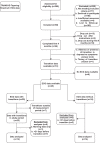Predicting recurrence of depression using cardiac complexity in individuals tapering antidepressants
- PMID: 37253734
- PMCID: PMC10229565
- DOI: 10.1038/s41398-023-02474-7
Predicting recurrence of depression using cardiac complexity in individuals tapering antidepressants
Abstract
It is currently unknown whether the complexity and variability of cardiac dynamics predicts future depression and whether within-subject change herein precedes the recurrence of depression. We tested this in an innovative repeated single-subject study in individuals who had a history of depression and were tapering their antidepressants. In 50 individuals, electrocardiogram (ECG) derived Interbeat-interval (IBI) time-series data were collected for 5 min every morning and evening, for 4 months. Usable data were obtained from 14 participants who experienced a transition (i.e., a clinically significant increase in depressive symptoms) and 14 who did not. The mean, standard deviation, Higuchi dimension and multiscale entropy, calculated from IBIs, were examined for time trends. These quantifiers were also averaged over a baseline period and compared between the groups. No consistent trends were observed in any quantifier before increases in depressive symptoms within individuals. The entropy baseline levels significantly differed between the two groups (morning: P value < 0.001, Cohen's d = -2.185; evening: P value < 0.001, Cohen's d = -1.797) and predicted the recurrence of depressive symptoms, in the current sample. Moreover, higher mean IBIs and Higuchi dimensions were observed in individuals who experienced transitions. While we found little evidence to support the existence of within- individual warning signals in IBI time-series data preceding an upcoming depressive transition, our results indicate that individuals who taper antidepressants and showed lower entropy of cardiac dynamics exhibited a higher chance of recurrence of depression. Hence, entropy could be a potential digital phenotype for assessing the risk of recurrence of depression in the short term while tapering antidepressants.
© 2023. The Author(s).
Conflict of interest statement
The authors declare no competing interests.
Figures



References
-
- Geddes JR, Carney SM, Davies C. Relapse prevention in antidepressant drug treatment in depressive disorders: a systematic review. Lancet. 2003;361:653–61. - PubMed
-
- Glue P, Donovan MR, Kolluri S, Emir B. Meta-analysis of relapse prevention antidepressant trials in depressive disorders. Aus N Z J Psychiatry. 2010;44:697–705. - PubMed
-
- Scheffer M, Bascompte J, Brock WA, Brovkin V, Carpenter SR, Dakos V, et al. Early-warning signals for critical transitions. Nature. 2009;461:53–9. - PubMed
Publication types
MeSH terms
Substances
LinkOut - more resources
Full Text Sources
Medical

